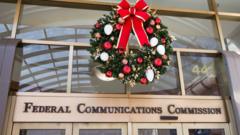In a landmark ruling, the U.S. Court of Appeals has dismissed the Biden administration's attempts to revive net neutrality rules, declaring that the federal government lacks authority to impose utility-like regulations on internet service providers. This decision stands as a considerable blow to advocates of an open internet, who have long advocated for regulations ensuring that internet providers, such as AT&T, treat all legal content without discrimination.
Net neutrality regulations were first established by the Federal Communications Commission (FCC) under former President Barack Obama but were subsequently abolished during Donald Trump's presidency. With Trump potentially returning to the White House, it seems to draw a close to a protracted legal struggle surrounding these rules.
The court's judges acknowledged the ongoing back-and-forth nature of this regulatory issue across different administrations. However, they noted a pivotal change in legal interpretation, referring to a recent Supreme Court ruling that restricts federal agencies' authority to interpret laws autonomously. “Applying Loper Bright means we can end the FCC's vacillations,” asserted the Sixth Circuit Court of Appeals.
Brendan Carr, a Republican FCC member appointed by Trump, expressed his satisfaction with the court's ruling, characterizing the Biden administration’s efforts as an "Internet power grab." Jessica Rosenworcel, the outgoing Democratic commissioner of the FCC, argued that the ruling compels Congress to step in and uphold net neutrality as consumers nationwide demand an internet that remains equitable and unrestricted.
The battle for net neutrality once garnered massive public attention, including a notable moment when comedian John Oliver rallied viewers to voice their support, resulting in overwhelming government response. However, since the rules were discarded in 2018, public interest in the issue has waned significantly.
While state-level net neutrality regulations remain unaffected by this ruling, advocates highlight concerns regarding national regulations, which are deemed essential to prevent internet providers from selectively controlling content access and imposing additional fees for faster service.
Public Knowledge, a progressive internet policy organization, criticized the ruling for undermining the FCC’s capability to enforce privacy and public safety standards. They argued that the court mischaracterized internet service providers as merely offering "information" services, which they believe could lead to a "dangerous regulatory gap," ultimately compromising consumer protections. In contrast, USTelecom, representing major industry players like AT&T and Verizon, hailed the decision as a win for American consumers, promising increased investments and competition in the evolving digital market.






















